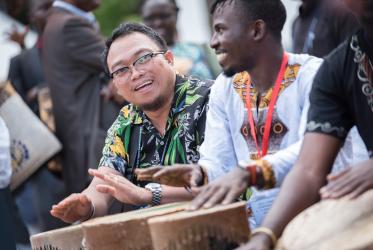Dr Dietrich Werner, of the World Council of Churches (WCC) staff, is the recipient of an honorary Doctorate in Divinity, awarded to him by Serampore College in India. The title was conferred in recognition of Werner’s long-term contributions to theological education, mission and ecumenism, and for building ecumenical partnerships among Christian academic institutions in Asia and advising forums on theological education in India.
Werner, currently serving as programme executive for the WCC’s ecumenical theological education programme, received this honour in early February at the general convocation of the Senate of Serampore College in India, a Christian institution founded in 1818 and representing some 54 theological colleges in India and beyond.
An ordained minister of the Evangelical Church in Germany, Werner received his education from the University of Göttingen and the University of Tuebingen in Germany, the University of Edinburgh, Scotland and the Ecumenical Institute in Bossey, Switzerland. “True to the tradition of his alma maters, he remains in mind and soul an ecumenist and spends all his energies in promoting theological education,” reads the summary citation of his doctorate degree.
Werner is author and editor of a number of monographs and anthologies in both German and English, amongst which are five major global handbooks on theological education. He has about eighty academic articles to his credit on subjects related to theology, mission and World Christianity.
Werner is co-founder of the Global Digital Library for Theology and Ecumenism (GlobeTheoLib). He also successfully ran the Global Ecumenical Theological Institute (GETI) programme bringing young theologians from around the world to participate in the WCC assembly held last year in South Korea.
Speaking at the convocation in India, Werner said that an ecumenical theological framework implies “setting aside all group politics, on whatever partial identities they may be based, denomination, caste- or culture-wise, or gender-based, and to contribute to one common task and ecumenical concern for a comprehensive theology of life.”
Theologies related to group identities, such as Dalit theology, Tribal theology or Feminist theology have a certain legitimate value and relevance in affirming the rights and cultural identities of those who have been marginalized, Werner said.
However, this should not “tear apart the unity of the Church” especially when we want to develop a “common theology of life for all creation on this earth” he added.
While concluding his service at the WCC, Werner has taken up a new assignment at Bread for the World's Church Development Services in Berlin, Germany, as senior advisor for theology, ecumenical education and research.
Read full text of Dietrich Werner’s speech at the Serampore College convocation






